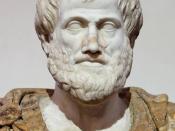Science is a body of verifiable knowledge, which is empirical and contains a set of guidelines, which are to be used when investigating the unperceived, known as the scientific method (Webster 656). Before the Scientific Revolution, which initially began during the mid sixteenth century, science was predominantly known as Natural Philosophy. Natural Philosophy is a term applied to the objective study of nature and the physical universe. The Scientific Revolution saw the inception of modern scientific methods, led to advancements in technology, and gave birth to the Scientist. The following paragraphs will introduce the reader to what Natural Philosophy is, a brief history of how it came about, and show how similar the Scientist and Natural Philosopher are.
Natural Philosophy erupted in Ancient Greece due to three main factors: the marketplace, competitive spirit, and religion. Much Greek life oriented around the market place, which was used not only as a means to exchange and trade goods, but often ideas and practices as well.
Marketplaces would often serve as a public forum, where politics, medicine and philosophy were exchanged as frequently as goods (Ede, Cormack 16). At this time Greece was not a single political entity, but was made up of a collection of city states that were continuously competing against each other. This constant competition to be the best fueled exploration, which in return granted Greece and abundance of material and intellectual wealth (Ede, Cormack 15). Although competitiveness and the frequent exchange of new ideas played a major role in the development of the Natural Philosophy evolution, it was the people of GreeceÃÂs ability to separate the natural from the supernatural which solidified its era. Greeks were not inclined to attributing every physical detail or object with the spiritual world because they believed that the gods were, in part, human...


